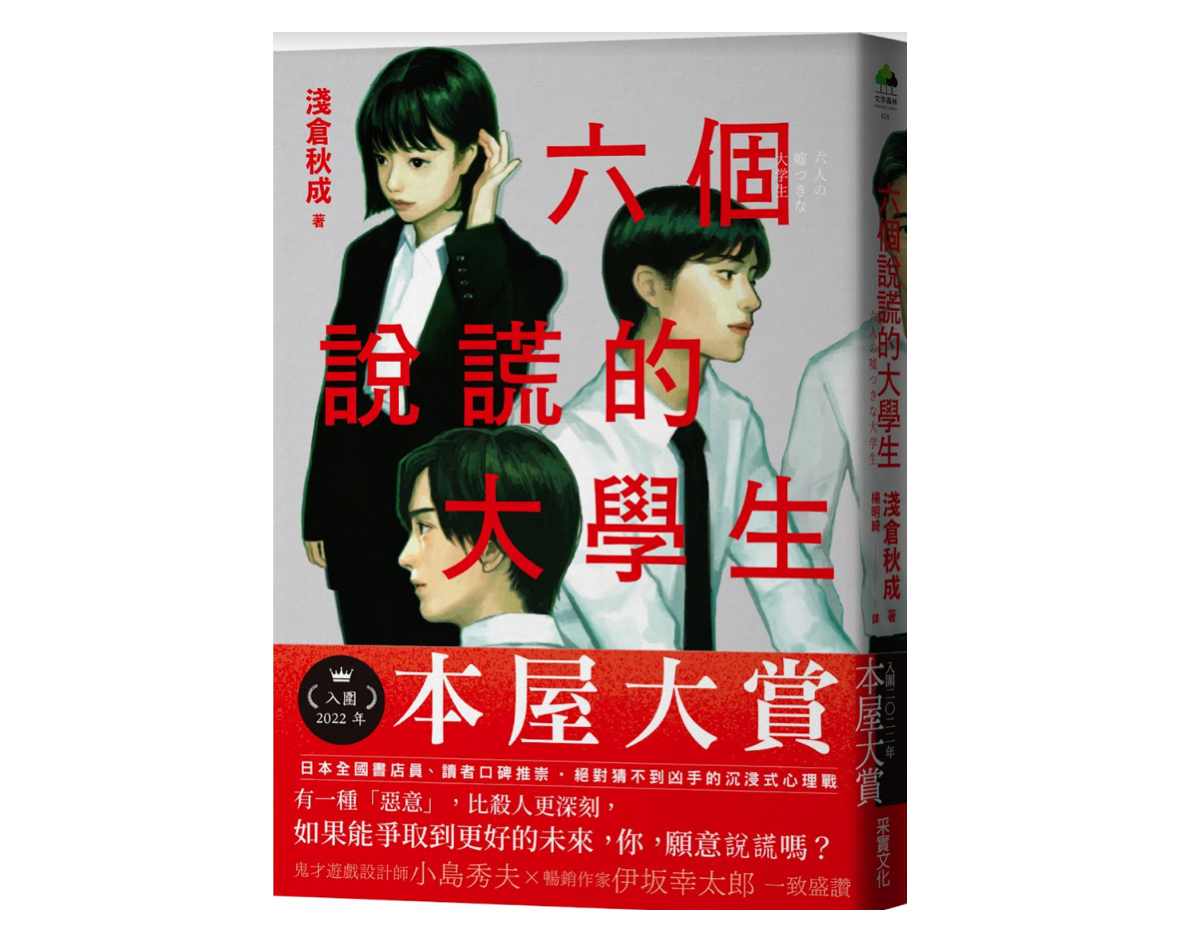[New Book Introduction] "Six Lying College Students": Is the "unspeakable" past really unspeakable?
We often say that everyone is special, and the values that are valued in this era are diverse, but in fact, as long as you step into the society for a job, you will feel cheated immediately, because in order to get some ideal jobs, People all know that they should maintain a certain image, beautify and embellish their past, and express it as a moving and "characteristic" story. But is our life really equivalent to this "story"? But it is a big question mark, because in order to make this story, we must ignore and delete many negative events in the past, even if these events are the experiences that really affect our values, but it is difficult to say in job interviews and college entrance examinations. out, because they are not "positive" enough and degrade their image and worth.

The novel "Six Lying College Students" published by Japanese writer Asakura Akicheng in 2021 describes six college students who participated in a highly competitive IT company interview, stood out from more than 5,000 students, and came to the final level. Originally, I heard the company's statement that as long as everyone performed well in the final group discussion, all of them would be admitted. Unexpectedly, it suddenly changed, and only one of the six people could get the position, and the final group discussion was to ask them to discuss who is the best. suitable for this job.
The message turned their nearly month-long friendship, like an instant betrayal, into a painful competitive anxiety. But what made the situation even worse was that in the final group discussion, someone exposed everyone's embarrassing past in the meeting in the form of an anonymous letter. It was also at this time that everyone discovered that there were some ulterior scandals behind the glamorous one another. The final group discussion also caused everyone to tear off the masks they usually put on their faces, from a harmonious and mutually encouraging teamwork to a mutual suspicion and refutation, and targeting the "criminal" who made the whistleblower letter. Expand complex reasoning.
In the process of finding the "prisoner" of the whistleblower, as the past of different characters is revealed, the novel has several plot twists, and each time it makes people's impression of the characters change completely, and it also makes us more curious." Who would the "prisoner" be, and how would the "prisoner" reveal his past in order not to be found out that he was the initiator of the whistleblower letter? To make yourself appear to be one of the "victims"?
Through this "reasoning" and the characters' refutation of the scandal, "Six Liars College Students" not only explores friendship and trust between people, but also brings out the true theme behind the book: how to face it. Your own unspeakable past? And how should we truly treat others equally? These leaked smears, such as having been involved in bullying or getting a girlfriend pregnant out of wedlock, seem to be major and reprehensible personal faults, but if only because of such a fragment, this person will be completely denied, whether it is And fair? Or even completely rupture the emotions built between them?
The theme described in "Six Lying College Students" is the anxiety of people living in modern society. In order to obtain what we call "success" and become a "victory group in life", each character in it has to try his best to hide his dark history. , and strive to show a positive, positive and open character in the party, and even order a drink to speculate on the impression in the eyes of others, so that although the relationship between the six seems to be "harmonious", it is actually full of tension and deep. Afraid of accidentally revealing one's own vulnerable side and the stain of failure as a human being.
If we all know that no one can be perfect, why should we be so afraid to reveal our past flaws? The whistleblower letter in the novel is undoubtedly a bad method, but the "whistle letter" is also like a new opening, allowing us to finally face up to the hidden pain in everyone's heart. It's just that it's bad because the whistleblower letter, like the image of "success", only evaluates the characters presented by the content of the fragments. If we, like the protagonists in the novel, choose to continue to trace the deeper past of different characters, Our thoughts on “people” and “success” will definitely be more different, and we will be able to face and think about the various stains and “failure” experiences that already exist in life with a more lenient and inclusive attitude. Because the important thing may not be to condemn people's mistakes, but to see the complex relationships and emotions between people in layers of criticism and understanding. The so-called "unspeakable" may not be true. It is the unwillingness to truly understand each other that leads to many dark pasts becoming "unseen" regrets.
(This article is a collaboration with Caishi Culture, which is published on the Literary Lab’s website)
Blog to link: https://pse.is/43wu78
FB Fan: https://pse.is/TCBRA
IG account: https://www.instagram.com/bungoussteins/
Like my work? Don't forget to support and clap, let me know that you are with me on the road of creation. Keep this enthusiasm together!